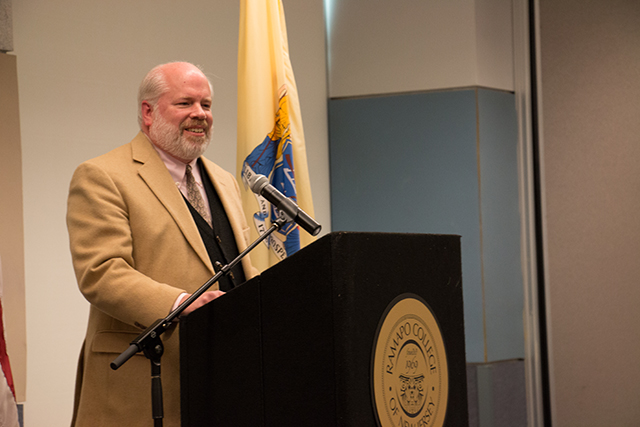
Photo by Steve Fallon
Gregg Edwards, the deputy secretary of higher education in the state of New Jersey, came to speak to Ramapo students and faculty on Friday. Edwards’s speech was the final event of Higher Education Awareness week; similar events and presentations took place earlier in the week, including a speech by Mila Jasey, a N.J. assemblywoman and chair of the assembly committee on higher education.
“Throughout the week, the Student Government raised awareness about higher education issues that directly impact us all, especially those that affect our tuition,” Kevin Ng, a student government representative, said in an email.
One of the goals of the week was to inform students about state funding deficiencies and the impact such deficiencies can have on college campuses. An emphasis was placed on looking for ways to initiate change, in the hope that students will vote and learn how to contact their state legislators about issues of higher education that they are passionate about.
Edwards spoke about the forces working both for and against higher education institutions in New Jersey, and posed potential solutions to these problems. Edwards chose to stick to higher education policy issues, such as funding, that are more important to students attending colleges and universities in the state.
One of the main issues he focused on was decreased funding for higher education from the state. Edwards said that if more money were to enter the system, there would be a greater ability for colleges to achieve their goals, for example, by increasing graduation rates.
Edwards also talked about the issues of autonomy affecting institutions of higher education. When it came to Ramapo, Edwards spoke of the popularity of our college and Ramapo’s sister colleges.
“Our proximity to quality and our geography is what makes us different. New Jersey is the number one exporter of students; meanwhile our kids don’t travel far to go to colleges,” Edwards said.
When asked about the main problems facing New Jersey’s higher education system, Edwards responded that he believes it has to do with the state imposing solutions to problems that they do not fully understand.
“I think the theme of the problems is the lack of colleges being able to solve their own problems and fix their own issues,” Edwards answered. “If we gave our institutions an increase in flexibility it would be a better thing; problems could be solved if the state of New Jersey would leave the issues to those who understand them.”
Another issue Edwards brought up was the practice of online learning. He believes that in order for online classes to be successful, colleges will need more time to work out the kinks.
“We don’t have the right regulatory actions to support that right now. There would have to be more implementation on the core curriculum," Edwards said.
The students attending the event all seemed to react positively to his message and summary of the problems facing New Jersey colleges and universities.
Sophomore Megan Patel felt Edwards communicated the problems facing higher education clearly and effectively.
“I did think it was very effective, and I do believe he has good intentions for the colleges. He was very clear and specific and definitely has a lot of goals,” Patel said.
Amanda Khoudary, a freshman, noted how his speech went beyond the everyday grievances of students, instead focusing on the political and structural problems facing higher education today.
“I liked how he tended to focus more on the infrastructure of the problem as opposed to the student body,” said Khoudary. “He was definitely very informative.”
lheckelm@ramapo.edu





